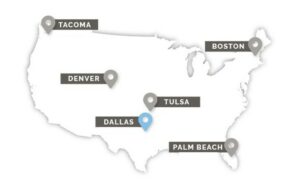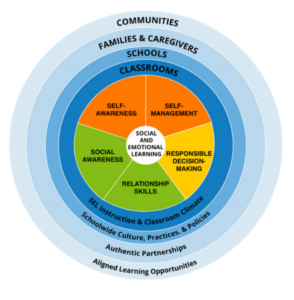Purpose & Background
In the summer of 2017, Dallas Independent School District and Big Thought were awarded a six-year Partnerships for Social and Emotional Learning Initiative (PSELI) implementation grant from the Wallace Foundation. The grant’s guiding question is: If urban schools and their afterschool partners work together to improve and align experiences and climate to foster children’s social and emotional learning, will students benefit?
Six communities were chosen by The Wallace Foundation to receive six-year PSELI implementation grants.
Each of these communities had previously committed to including social and emotional learning in their services to children. Sites were chosen based on fit with The Wallace Foundation’s dual goals of helping local partners to strengthen their capacity and developing new knowledge that will be useful to the field.

Partners
To effectively answer this question in Dallas, Dallas ISD and Big Thought are partnering with Dallas Afterschool and City Of Dallas Park & Recreation to align planning, training, and continuous cycles of improvement for the benefit of staff and students at our 14 PSELI grant sites. This ongoing collaborative partnership among Dallas ISD, Big Thought, Dallas Afterschool, and the City of Dallas Parks & Recreation is called SEL Dallas. The SEL Dallas team receives ongoing planning and implementation support from our technical assistance partners at CASEL and the David P. Weikart Center for Youth Program Quality.
Grant Phases
Our 14 PSELI grant sites are broken up into two Phases. Phase I sites are expected to implement comprehensive SEL in grant years 1 through 4, which includes intensive, ongoing support from all local partners.
Alternatively, Phase II sites, during grant years 1-4, are meant to operate “business as usual” and not implement any SEL practices or related training (for in- or out of school time) as part of a long-term study of PSELI implementation.
During grant years 5-6, Phase II sites lead their SEL implementation process and receive ongoing support for in- and out of school alignment at an accelerated pace with local partner guidance.

Long-Term Study
To document the learning process and collect relevant information for the field, The Wallace Foundation has partnered with the RAND Corporation to conduct a long-term study of the PSELI grant (across six PSELI communities). Not only does this benefit each of the PSELI communities as they receive ongoing data and feedback from students and staff members over the course of the grant but this likewise contributes to a national understanding of what it takes to effectively align in- and out of school SEL implementation efforts for meaningful impact.









